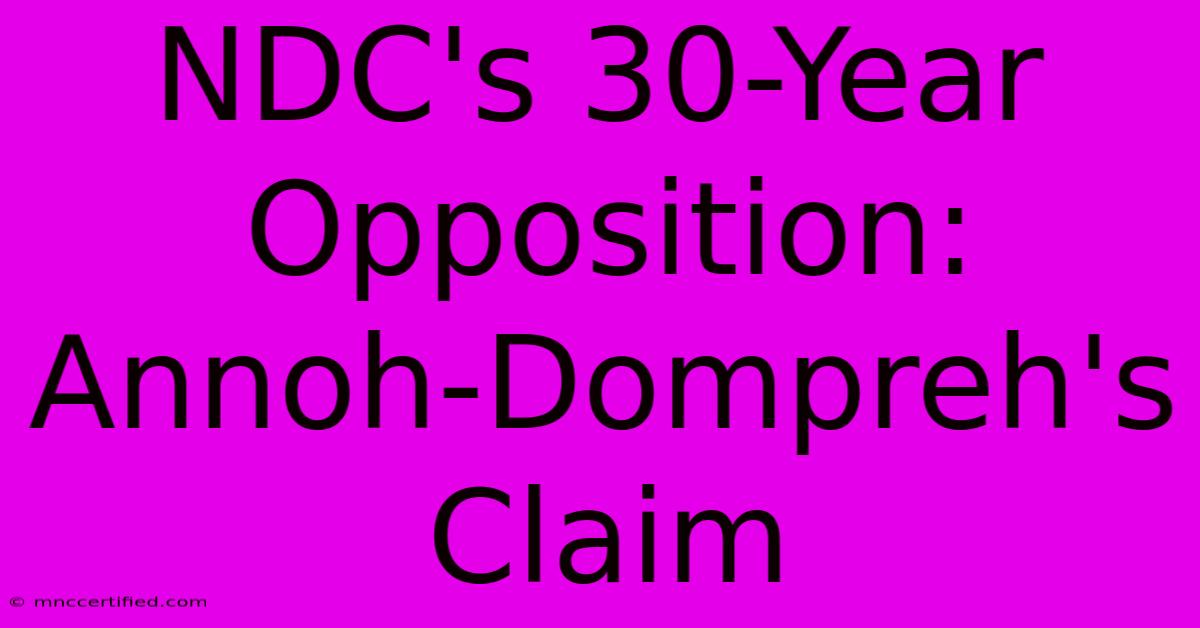NDC's 30-Year Opposition: Annoh-Dompreh's Claim

Table of Contents
NDC's 30-Year Opposition: Annoh-Dompreh's Claim – Fact-Check and Analysis
The recent claim by NPP General Secretary, Justin Frimpong Kodua, that the National Democratic Congress (NDC) has spent 30 years in opposition has sparked intense debate. This assertion, echoed by other NPP members, including the majority leader, Osei Kyei-Mensah-Bonsu, needs thorough examination. While the NDC has indeed spent significant time in opposition, the precise figure of 30 years requires careful scrutiny. This article will delve into the specifics of the NDC's time in opposition, analyzing the claim and its implications for Ghanaian politics.
Understanding the Claim: 30 Years in Opposition?
The claim of 30 years in opposition for the NDC needs clarification. It's crucial to define "opposition" accurately. Does it refer to the period since the NDC's formation, or does it encompass only periods where the NDC wasn't in power at the national level? The nuances are significant. The NPP's framing seemingly suggests the NDC has been perpetually out of power, potentially painting a picture of a party perpetually unable to govern effectively. This narrative, however, needs rigorous fact-checking.
Analyzing the NDC's History: A Timeline of Power and Opposition
The NDC's history is intertwined with the broader political landscape of Ghana. The party, tracing its roots back to the Provisional National Defence Council (PNDC), has seen periods of both power and opposition. A precise timeline helps determine the validity of the 30-year claim:
- 1992-2000: Jerry Rawlings leads the NDC to victory, serving two terms as President.
- 2000-2008: The NPP under John Kufuor takes power. This is the first significant period of NDC opposition.
- 2008-2016: John Atta Mills and John Mahama lead the NDC back to power for two terms.
- 2016-Present: The NPP, under Nana Akufo-Addo, assumes power, marking a second period of NDC opposition.
Adding up the years in opposition (2000-2008 and 2016-Present) does not reach 30 years. While a significant portion of the NDC's existence has been spent out of power, the 30-year figure seems inflated. The claim needs to be contextualized within the broader political history of Ghana, acknowledging the transitions and periods of both NDC and NPP governance.
The Political Implications of the Claim
The NPP's emphasis on the NDC's time in opposition is a clear political strategy. By highlighting this period, the NPP attempts to create a narrative of incompetence and unsuitability for governance. This is a common tactic in political discourse, aiming to undermine the opposition's credibility and garner support for the ruling party.
However, simply stating the number of years in opposition without acknowledging the complexities of Ghanaian politics is a simplification. The NDC's opposition periods have varied in terms of their effectiveness, influence, and impact on national policy. The claim needs further analysis considering these aspects.
Conclusion: Beyond the Numbers
While the NDC has spent considerable time in opposition, the claim of 30 years is an oversimplification and potentially misleading. The NPP's assertion needs a more nuanced examination, acknowledging the complexities of Ghana's political history and the varying nature of opposition politics. A more thorough and objective analysis reveals the claim to be exaggerated. Focusing solely on the length of time in opposition neglects the party's successes, achievements during its periods in power, and its continued relevance in the Ghanaian political landscape. The debate highlights the need for more rigorous fact-checking and responsible political communication in Ghana.
Keywords: NDC, NPP, Ghanaian Politics, Opposition, Annoh-Dompreh, Justin Frimpong Kodua, Osei Kyei-Mensah-Bonsu, Jerry Rawlings, John Kufuor, John Atta Mills, John Mahama, Nana Akufo-Addo, Fact-Check, Political Analysis, Ghana Elections.

Thank you for visiting our website wich cover about NDC's 30-Year Opposition: Annoh-Dompreh's Claim. We hope the information provided has been useful to you. Feel free to contact us if you have any questions or need further assistance. See you next time and dont miss to bookmark.
Featured Posts
-
Rittenhouse Bottled In Bond
Dec 01, 2024
-
Salmonella Outbreak Cucumber Recall
Dec 01, 2024
-
Support Local Small Business Saturday
Dec 01, 2024
-
Wallace Support Letter On Display
Dec 01, 2024
-
Survivor Series War Games 2024 Match Card And Results
Dec 01, 2024